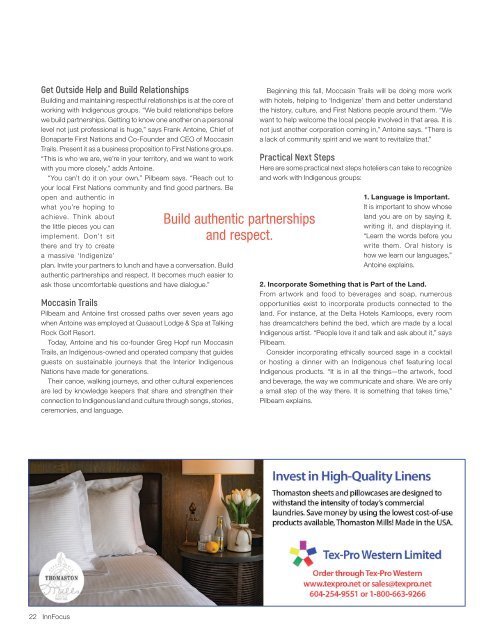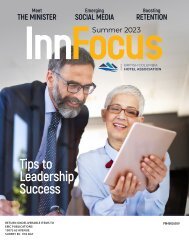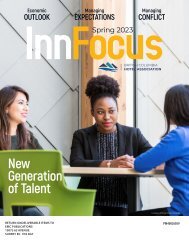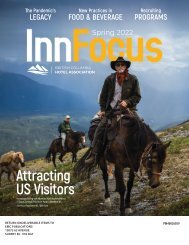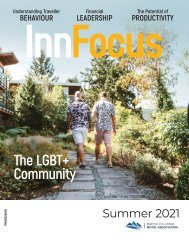InnFocus Fall 2023
InnFocus magazine for hoteliers in British Columbia
InnFocus magazine for hoteliers in British Columbia
You also want an ePaper? Increase the reach of your titles
YUMPU automatically turns print PDFs into web optimized ePapers that Google loves.
Get Outside Help and Build Relationships<br />
Building and maintaining respectful relationships is at the core of<br />
working with Indigenous groups. “We build relationships before<br />
we build partnerships. Getting to know one another on a personal<br />
level not just professional is huge,” says Frank Antoine, Chief of<br />
Bonaparte First Nations and Co-Founder and CEO of Moccasin<br />
Trails. Present it as a business proposition to First Nations groups.<br />
“This is who we are, we’re in your territory, and we want to work<br />
with you more closely,” adds Antoine.<br />
“You can’t do it on your own,” Pilbeam says. “Reach out to<br />
your local First Nations community and find good partners. Be<br />
open and authentic in<br />
what you’re hoping to<br />
achieve. Think about<br />
the little pieces you can<br />
implement. Don’t sit<br />
there and try to create<br />
a massive ‘Indigenize’<br />
plan. Invite your partners to lunch and have a conversation. Build<br />
authentic partnerships and respect. It becomes much easier to<br />
ask those uncomfortable questions and have dialogue.”<br />
Moccasin Trails<br />
Pilbeam and Antoine first crossed paths over seven years ago<br />
when Antoine was employed at Quaaout Lodge & Spa at Talking<br />
Rock Golf Resort.<br />
Today, Antoine and his co-founder Greg Hopf run Moccasin<br />
Trails, an Indigenous-owned and operated company that guides<br />
guests on sustainable journeys that the Interior Indigenous<br />
Nations have made for generations.<br />
Their canoe, walking journeys, and other cultural experiences<br />
are led by knowledge keepers that share and strengthen their<br />
connection to Indigenous land and culture through songs, stories,<br />
ceremonies, and language.<br />
Build authentic partnerships<br />
and respect.<br />
Beginning this fall, Moccasin Trails will be doing more work<br />
with hotels, helping to ‘Indigenize’ them and better understand<br />
the history, culture, and First Nations people around them. “We<br />
want to help welcome the local people involved in that area. It is<br />
not just another corporation coming in,” Antoine says. “There is<br />
a lack of community spirit and we want to revitalize that.”<br />
Practical Next Steps<br />
Here are some practical next steps hoteliers can take to recognize<br />
and work with Indigenous groups:<br />
1. Language is Important.<br />
It is important to show whose<br />
land you are on by saying it,<br />
writing it, and displaying it.<br />
“Learn the words before you<br />
write them. Oral history is<br />
how we learn our languages,”<br />
Antoine explains.<br />
2. Incorporate Something that is Part of the Land.<br />
From artwork and food to beverages and soap, numerous<br />
opportunities exist to incorporate products connected to the<br />
land. For instance, at the Delta Hotels Kamloops, every room<br />
has dreamcatchers behind the bed, which are made by a local<br />
Indigenous artist. “People love it and talk and ask about it,” says<br />
Pilbeam.<br />
Consider incorporating ethically sourced sage in a cocktail<br />
or hosting a dinner with an Indigenous chef featuring local<br />
Indigenous products. “It is in all the things—the artwork, food<br />
and beverage, the way we communicate and share. We are only<br />
a small step of the way there. It is something that takes time,”<br />
Pilbeam explains.<br />
22 <strong>InnFocus</strong>


